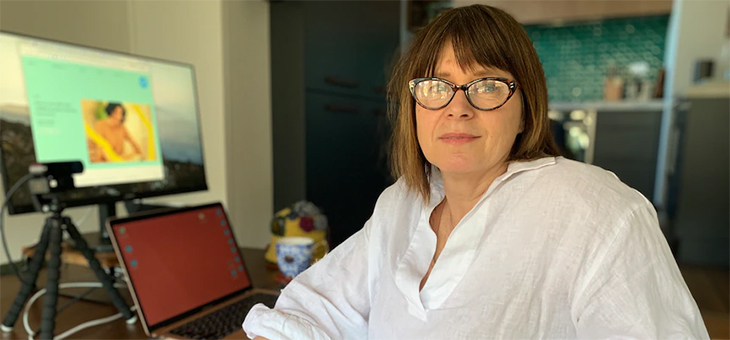Lisa Hansen wanted to change up her regular video calls with her family locked down in Sydney.
“Over time we realised we had not as much to talk about,” she said.
The Tasmanian resident came up with the idea of doing paint and sip sessions online.
Now what started as a one-off has become a weekly event.
“I’d never done anything like that before, so I went on YouTube. There are so many painting tutorials on there,” she said.
“It’s something relaxing to do … we might have a glass of wine or two.”
The sessions have provided a welcome distraction from the pandemic.
“We get to chat about what’s going on, how we’re feeling,” she said.
“It’s hard sometimes, I speak to Mum and she was upset just hearing that it [the lockdown] is going to be extended again.
“I think it’s just a small thing I can do to kind of perk up their weekends.”
Care packages with handwritten messages
As lockdown drags on for millions of people across Australia, many of their family and friends in other states have been left wondering how best to help.
Care packages have become a popular way to show support.
Hobart chocolate shop owner Helen Curtis has been busy in recent weeks packing sweet treats to send interstate.
“Everyone wants to reach out to their family member or friend and just let them know how much they’re thinking of them,” she said.
Ms Curtis handwrites messages from customers.
“They understand this is a really hard time and just want them to have something they might enjoy and maybe make their day better,” she said.
Read more about the spread of COVID-19 in Australia:
- When and where will Rapid COVID-19 antigen testing be used?
- Here’s what’s changing in regional Victoria tonight
- International COVID vaccine passports on the way
Finding the ‘novelty’ in connecting
Clinical psychologist Jo Mitchell, from The Mind Room, said random acts of social connection were key to providing support.
“We’re into almost two years of lockdown, I think that we’ve got to find the novelty and different ways of connecting,” she said.
“Rather than it being every week we do a phone call to the family … it’s just dropping in on them in different ways.”
She suggested sending a postcard or catching up online in new ways.
“The other day we organised an ice cream date for a family … where you just had to turn up [online] with your ice cream,” she said.
“Pretty simple, but kind of fun.”
She said when checking in with family and friends in lockdown, listening was key.
“[You can] get into this ‘I’ve got to fix it for you’ mode or ‘I’ve got to help you or do something about this,'” she said.
“I think the capacity to just stop and listen and tune in to what others are saying is a really underrated skill at the moment.”
Tips for providing support to loved ones in lockdown
- Mix it up: come up with new ways to connect, like an online ice cream-eating session
- Don’t try to ‘fix’ the situation: practise active listening
- Be sensitive: consider whether you should share weekend plans if you’re not locked down
- Refer to professional help if needed
Dr Mitchell suggested that those who are not in lockdown be sensitive about how much they reveal about their weekend activities.
“I usually have a statement that lets people know I feel really guilty but I am also very grateful for the fact that I do have access to these things,” she said.
“And kind of gauge from the other person whether they just want to hear about your life … and if that’s really helpful for them or whether mentioning that you’re off to Coles Bay [on Tasmania’s east coast] for the weekend might be a little bit much.”
She said if somebody was struggling with serious mental health issues it was important to encourage them to seek professional support.
“We are fundamentally social creatures,” Dr Mitchell said.
“Digital connection is one thing and it definitely helps us, but real-life touching, hugging, being close to other humans is actually what we’re designed for.”
She said one positive that could be taken from the pandemic was a greater willingness to discuss mental health.
“I think that is the gift that we have been given through lockdown,” she said.
 © 2020 Australian Broadcasting Corporation. All rights reserved.
© 2020 Australian Broadcasting Corporation. All rights reserved.
ABC Content Disclaimer

